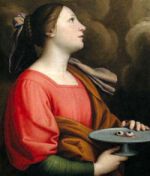Fathers of the Church
Letter CCXCIV: to Festus and Magnus
by Basil the Great in 357-370 | translated by Blomfield Jackson, M.A
IT is doubtless a father's duty to make provision for his children; a husbandman's to tend his plants and crops; a teacher's to bestow care upon his pupils, especially when, innate goodness shews signs of promise for them.
The husbandman finds toil a pleasure when he sees the ears ripen or the plants increase; the teacher is gladdened at his pupils' growth in knowledge, the father at his son's in stature. But greater is the care I feel for you; higher the hopes I entertain; in proportion as piety is more excellent than all the arts, than all the animals and fruits together.
And piety I planted in your heart while still pure and tender, and I matured it in the hopes of seeing it reach maturity and bearing fruits in due season. My prayers meanwhile were furthered by your love of learning. And you know well that you have my good wishes, and that God's favour rests upon your endevours; for when rightly directed, called or uncalled, God is at hand to further them.
Now every man that loves God is prone to teaching; nay, where there is the power to teach things profitable, their eagerness is well nigh uncontrollable; but first their hearers' minds must be cleared of all resistance.
Not that separation in the body is a hindrance to instruction. The Creator, in the fulness of His love and wisdom, did not confine our minds within our bodies, nor the power of speaking to our tongues. Ability to profit derives some advantage even from lapse of time; thus we are able to transmit instruction, not only to those who are dwelling far away, but even to those who are hereafter to be born. And experience proves my words: those who lived many years before teach posterity by instruction preserved in their writings; and we, though so far separated in the body, are always near in thought, and converse together with ease.
Instruction is bounded neither by sea nor land, if only we have a care for our souls' profit.
Taken from "The Early Church Fathers and Other Works" originally published by Wm. B. Eerdmans Pub. Co. in English in Edinburgh, Scotland, beginning in 1867. (PNPF II/VIII, Schaff and Wace). The digital version is by The Electronic Bible Society, P.O. Box 701356, Dallas, TX 75370, 214-407-WORD.






